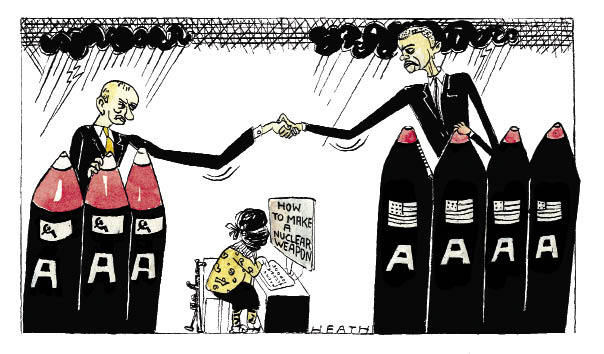Mr Alistair Darling, the Chancellor of the Exchequer, Mr George Osborne, the shadow Chancellor, and Mr Vince Cable, the Liberal Democrat Treasury spokesman, held a debate on television. Many viewers had hoped one of them would fall off the tightrope, but none did. Mr Cable called Labour efficiency-saving plans a ‘fiction’ and accused the Tories of swallowing the fiction to fund their proposed cut, announced earlier that day, for low and middle earners, of the 1 per cent rise in National Insurance due in 2011. Earlier, on being asked whether he accepted Treasury figures that suggested deeper, tougher cuts than those made by the Thatcher administration, Mr Darling said: ‘They will be deeper and tougher.’ The Institute of Fiscal Studies said that cuts in departments not ‘ring-fenced’ would reach more than 25 per cent by 2014. The Office for National Statistics said the economy grew by 0.4 per cent in the last quarter of 2009, not by 0.3 per cent as thought. The government proposed that care for old people should be funded by a compulsory levy, but not by a ‘death’ tax. Labour gave out little plastic cards with promises on them to: ‘secure the recovery; raise family living standards; build a high-tech economy; protect frontline services; strengthen fairness in communities’. Mr Tony Blair, the former Prime Minister, made a speech in support of Labour. Cider-makers, fortified by a re-release of ‘I am a Cider Drinker’ by the Wurzels, protested against the 10 per cent rise in excise duty imposed in the Budget.
British Airways suffered another four days of strikes by cabin staff, with increased animosity between the company and the trade union Unite. The National Union of Rail, Maritime and Transport Workers made plans for four days of strikes from 6 April, the first national rail strike since 1994. The Prince of Wales spent the night with British soldiers at Camp Bastion, in Helmand province, after visiting Kabul. ‘As a parent you worry the whole time. It’s ghastly,’ he said of Prince Harry’s service in the country. Mr Kevan Jones, a defence minister, apologised ‘unreservedly’ to Miss Joanna Lumley for suggesting to the Home Affairs Committee that there had been ‘a deathly silence’ from her about resettlement of Gurkhas. Camelot, the operator of the National Lottery, was sold to a Canadian teachers’ pension fund for £389 million. The Independent and Independent on Sunday were sold for £1 to Mr Alexander Lebedev, the rich former KGB officer who bought the Evening Standard for £1 last year. Mr David Yelland, a former editor of the Sun, said in a new book that he was ‘drunk nearly every night for 24 years’ and felt obliged, while reading The Waste Land in the office, to hide it inside a copy of his newspaper.
President Barack Obama of the United States and President Dmitry Medvedev of Russia agreed a nuclear arms reduction treaty limiting both sides to 1,550 warheads, about 30 per cent fewer than currently allowed. Women suicide bombers killed 38 on the Moscow metro, 24 at Lubyanka station beneath the offices of the Federalnaya Sluzhba Bezopasnosti, successors of the KGB, and 14 at Park Kultury station 40 minutes later. The FSB assumed it was the work of a group from the north Caucasus. Mr Nicolas Sarkozy flew to Washington for talks with President Obama. A summit of European leaders in Brussels said in a communiqué: ‘We consider that the European Council should become the economic government of the EU and we propose to increase its role in economic surveillance.’ But after complaints from Mr Gordon Brown, the British Prime Minister, the phrase ‘economic government’ was changed to ‘economic governance’ in the English translation.
Mr Iyad Allawi’s Iraqiya alliance won the Iraq general election, beating the Prime Minister, Mr Nouri Maliki’s State of Law alliance by two seats. President Obama visited American servicemen by night at Bagram air base in Afghanistan; he also met President Hamid Karzai at the presidential palace. China sentenced four executives of Rio Tinto Zinc to jail terms of between seven and 14 years on charges of bribery; one was an Australian and three Chinese. China’s 10th largest carmakers, Geely, agreed to buy Volvo from Ford for $1.8 billion. Rescuers sought to save 153 miners trapped underground at the Wangjialing coalmine in Shanxi province; seven miners a day die in China. Amnesty International said that 714 people had been executed round the world in 2009, not counting China, which executed thousands. A South Korean naval patrol vessel, the 1,200-ton Cheonan, sank near the disputed maritime border with North Korea; 58 crewmen were rescued but 46 were missing. Muammar Gaddafi, the ruler of Libya, had second thoughts about dividing Nigeria into two states, one Muslim and one Christian; he now favoured a break-up into several states, he said: ‘The model that fits Nigeria is the Yugoslav one.’ CSH






Comments